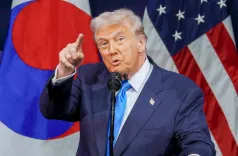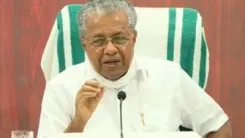South Korea's Strategic Response to US Tariffs on Semiconductors

Synopsis
Key Takeaways
- Swift support measures for the chip industry
- Negotiations with the U.S. to mitigate tariffs
- Focus on enhancing local semiconductor competitiveness
- Investment in AI chip development
- Encouraging corporate investment in the sector
Seoul, April 10 (NationPress) The government is set to rapidly implement support measures for the domestic chip sector to mitigate the repercussions of the United States' proposed tariffs on semiconductor imports, stated the industry minister on Thursday.
Industry Minister Ahn Duk-geun mentioned that these government initiatives will be unveiled shortly during a meeting with local chip manufacturers, where a strategy to counter the anticipated U.S. tariffs was discussed, as reported by Yonhap news agency.
U.S. President Donald Trump has indicated potential tariffs on semiconductor imports since his inauguration in January, reaffirming last week that they would commence “very soon.”
During Thursday’s gathering, semiconductor industry representatives urged the government to actively engage in negotiations with the U.S. and create support measures to lessen the tariffs' effects on local enterprises, according to the Ministry of Trade, Industry and Energy.
These business leaders acknowledged that the suggested tariffs might have a limited effect on the local chip industry, citing the U.S.'s restricted production capabilities and South Korea's substantial global market share, particularly in high-value products like high bandwidth memory.
Despite this, they voiced significant concerns over increasing uncertainties in the global trade landscape that could negatively impact the local industry and economy, as noted by the ministry.
The ministry indicated that the government's potential support measures for the chip sector might encompass tariff response vouchers and initiatives to alleviate cost pressures associated with materials and components that heavily depend on imports.
Moreover, the government is evaluating the expansion of domestic utilization of Korean-made chips for the national artificial intelligence (AI) computing center and providing assistance to Korean firms in exporting their chips to AI data centers in the Middle East and Southeast Asia.
To promote corporate investment in the semiconductor domain, the government is contemplating enhanced incentives, including increased financial support for the semiconductor cluster in Yongin, situated just south of Seoul, along with regulatory streamlining.
The ministry also stated that there will be efforts to boost the overall competitiveness of the semiconductor ecosystem, which includes the establishment of fabrication plants for advanced chips and the initiation of large-scale research and development (R&D) projects.
Specifically, the government aims to invest 1 trillion won (approximately US$674.3 million) in the development of on-device AI chips intended for use in the automotive, robotics, defense, and Internet of Things (IoT) sectors.
“The private and public sectors must collaborate to tackle the trade and supply chain risks we are currently encountering,” Ahn asserted.
“The government will persist in negotiations with the U.S. through various channels and promptly execute support measures for the semiconductor industry by leveraging the nation’s full capabilities, as the tariff conflict is also a competition to attract corporate investment,” he added.









